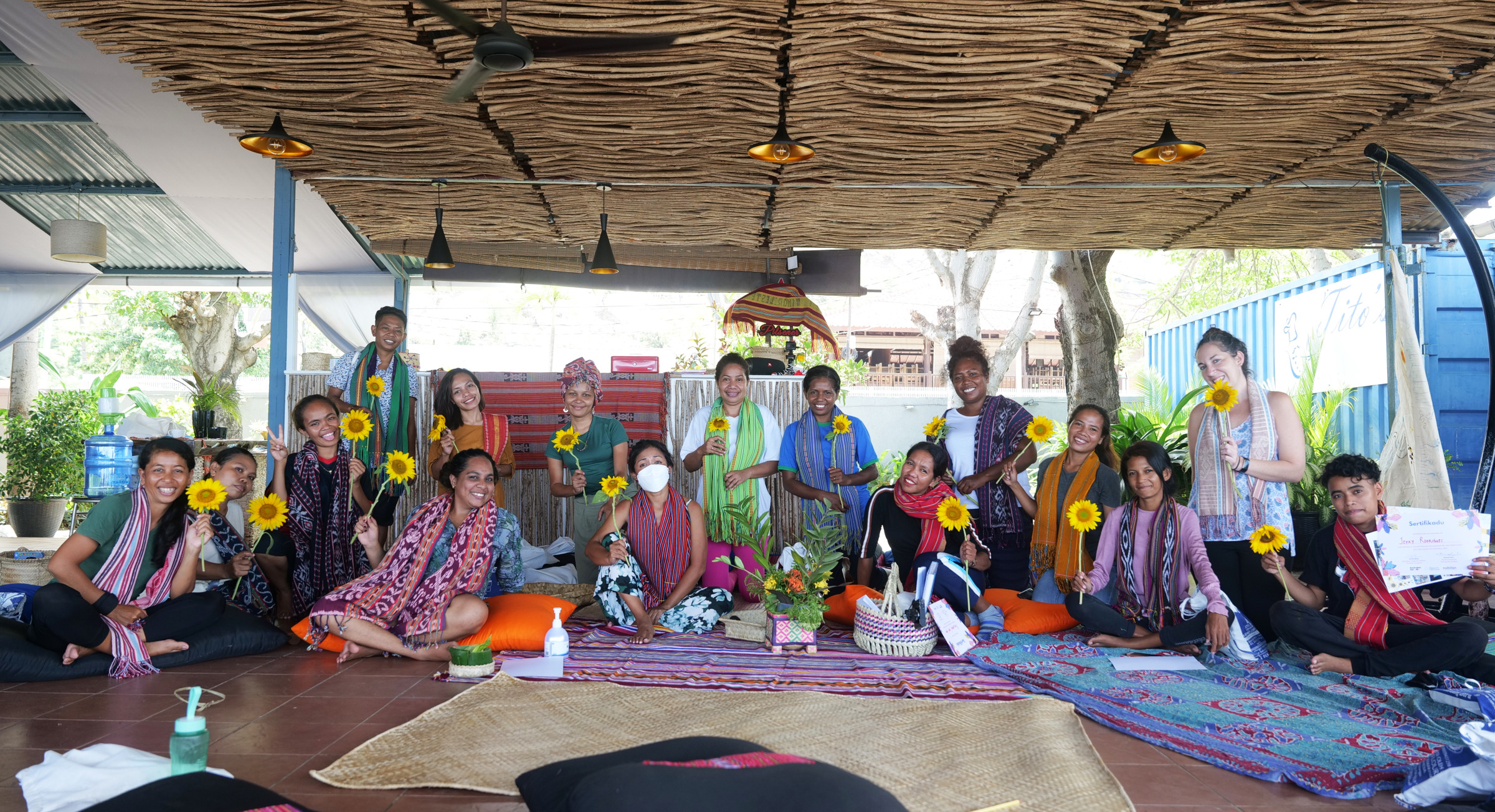Bin-Alin Hakbi’it Malu (Sisters Empowering Each Other): Resourcing feminist leadership and collective care in Timor-Leste

EQI’s work on decolonising violence against women and girls (VAWG) research and knowledge production has shifted thinking, built capacity, and created practical resources now informing projects across the Pacific and beyond.
Colonisation has left a profound and ongoing legacy – dispossession, genocide, repression of Indigenous cultures – and is a key driver of violence against women and girls. Rates of VAWG in communities affected by colonisation remain disproportionately high. For example, in colonised countries, intimate partner violence against women is 50 times more likely than in non-colonised countries. Yet, mainstream research practices and ‘Western’ knowledge production have often ignored or minimised the role of colonisation, while perpetuating extractive, unethical, and disempowering methods.
As an intersectional feminist organisation firmly placed in a settler/coloniser system, we recognised that dismantling these systems meant starting with our own research practice—a process requiring self-reflection, hard conversations, and uncomfortable truths.
This was also about recognising what we have the power to change, and ‘staying in our lane’: focusing on transforming our own practices rather than telling others—especially those in the Global South or historically marginalised communities—what they should do.
In 2022, EQI began an internal process aimed at better understanding how decolonising principles and practices could apply to our own policies and processes for knowledge production and the research we conduct on VAWG. We started with a reflective paper, led by our Senior Research Associate, Dr Sarah Homan, with collaborative input from the Research Team and our Founder and Co-CEO Emma Fulu, and reviewed by (paid) Global South scholars and practitioners. The piece set out the harmful and inequitable history—and present realities—of research on VAW, especially in the fields of Public Health and International Development. It also outlined principles of decolonial and intersectional feminist research, and reflected on examples of our work where we adhered to these principles, as well as times when we got it wrong.
This process was informed by reflective team conversations and a literature review that intentionally centred Indigenous and Global South perspectives (though we also reflected on the structural challenges of doing so). Reviewers commended the draft paper and offered constructive feedback that further strengthened it based on their lived experiences and scholarship.
That same year, we shared these learnings publicly at SVRI Forum 2022 in Cancún, Mexico, in a workshop titled “Confronting Uncomfortable Truths: Unlearning Colonial Research Methods for VAWG Research and Knowledge Production.” The session was hugely popular. Building on this, we facilitated a second workshop at SVRI Forum 2024 in Cape Town, South Africa, deepening the conversation and engaging new audiences.
This internal work has since informed the development of a practical project management tool (still being piloted) that embeds reflective practice into our research processes, as well as the creation of the Decolonising Research Tool (DRT)—a practical guide for applying decolonising principles to VAWG research. We are currently piloting the DRT with The Asia Foundation on projects exploring violence against women with disabilities and technology-facilitated GBV, with plans to expand its use to other major initiatives such as What Works.
This work is helping to address the colonial power structures that continue to shape how knowledge about violence against women and girls is produced, shared, and acted upon. By turning ideas into practical tools, our aim is to support researchers and practitioners to embed decolonising approaches into everyday practice, and to do so in ways that are meaningful and culturally relevant.
What began as a research paper has achieved wide readership around the world. For example, it was included in the briefing pack for the Global Cultural Assembly hosted by the Humboldt Forum in Berlin in June 2025—an assembly aiming to go beyond restitution and transform the way museums collaborate with people from countries where objects have been taken, collected, or stolen. The briefing pack reached more than 80 international delegates, alongside Humboldt Forum staff and museum representatives.
The work has also grown into workshops that drew strong interest and conversation across two continents—twice presented as pre-conference sessions for researchers at the SVRI Forum (2022 in Cancún, Mexico; 2024 in Cape Town, South Africa) under the title “Confronting Uncomfortable Truths: Unlearning Colonial Research Methods for VAWG Knowledge Production and Research.” These sessions strengthened capacity among hundreds of researchers and practitioners worldwide.
“EQI’s workshop on decolonising violence against women and girls research was really impactful. It raised many questions—not only how we think about partnerships but also how we act on this thinking in our day-to-day encounters, in an environment where there is a structural power imbalance by funding coming too often through Global North researchers like me. I kept having these discussions with my colleagues throughout SVRI 2022 and later. They definitely influenced the start of new projects and partnerships afterwards. So a huge thank you to the workshop facilitators for challenging us and our thinking.” – Global North Scholar and Workshop Participant who attended both workshops
Now, the project is becoming a tool to support applied research—currently being piloted. Along the way, it has created space for honest reflection, shared learning, and more equitable ways of working.
It has helped to:
While the process of decolonising our practice remains challenging and imperfect, we are committed to learning. This work has laid the foundation for sustained, systemic change in how VAWG research is conducted—and we believe ethical, feminist, and decolonial research practices should become the norm. We look forward to keeping you updated as we continue this journey.
The land we live and work on always was, and always will be, Aboriginal land. We pay our respects to the Traditional Custodians of Country throughout Australia and acknowledge the ongoing leadership role of Aboriginal & Torres Strait Islander communities in preventing violence against women. We also acknowledge Traditional Custodians of the lands where EQI works around the world.
Read MoreYou have been logged out.
"*" indicates required fields